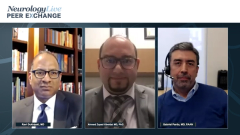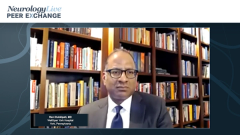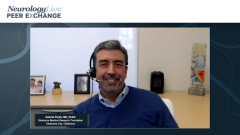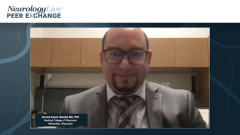
Challenges in Use of Generic DMTs for Treatment of MS
Experts in neurology provide insight on challenges that arise with the use of generic DMTs in RRMS treatment, such as cost to the patient.
Episodes in this series

Ahmed Zayed Obeidat MD, PhD: If a patient is on a generic medication and they’re having an adverse effect or they’re not responding to the efficacy, would you switch to a brand similar mechanism, or would you try to go out of the mechanism of action to start with?
Ravi Dukkipati, MD: We have to accept that generics are bioequivalent for the most part. And if a patient is objectively failing on a generic, I would be less inclined to keep them in the same class. I would use that as an opportunity to perhaps approach the patient and discuss alternatives that might offer higher efficacy. In other words, I would use that as an opportunity to switch to a different class.
Ahmed Zayed Obeidat MD, PhD: Dr Pardo?
Gabriel Pardo, MD, FAAN: Yes, I absolutely, entirely agree. It would be a different situation if they’re having adverse effects with that medication, not an efficacy problem. In that case, I might consider switching them to a branded medication within the class because I have not seen a failure. Or if it’s a significant safety concern, that would be the same situation. But otherwise, I would be thinking of a different class of medications, a different mechanism of action.
Ahmed Zayed Obeidat MD, PhD: I’d do the same. I would probably switch them to a different class, if knowing they were taking the medication right, that’s an important point.
Ravi Dukkipati, MD: This brings up an interesting point. It’s not directly your question, Dr Obeidat. But for example, with fingolimod and teriflunomide going generic, I’ve used it as an opportunity to hone in on these patients when they come in for follow-up and start from scratch and reevaluate where are they now. Are they doing well on this class? Rather than go to a generic, should this be an opportunity to perhaps consider a different class?
Ahmed Zayed Obeidat MD, PhD: One of the interesting stories in the history of MS [multiple sclerosis], is when generic glatiramer acetate came to market, the brand medication was a daily injection. Then when the generics came to market, it became a 3 times weekly injection. What people observed, and there are papers on that, is that the price of the brand glatiramer acetate spiked I think multiple-fold upon the approval of the generics. So, you have a generic approval. We’re trying to help reduce the cost of MS medications and improve access. And yet you have a generic that comes to market, and the price of the brand spikes multiple-fold. Then the generic of course is going to go up because the manufacturers just need to price it a little different than the brand, like maybe $10,000 or something.
Ravi Dukkipati, MD: There are many factors playing a role. But if you look at platform agents, they’ve been available for upward of 30 years. But if you track their prices over time, they’ve gone up.
Ahmed Zayed Obeidat MD, PhD: Yes, and there are papers published in Neurology that show the actual track. The price is just spiking and spiking; part is inflation, but not that much inflation. It’s interesting, especially for agents that have been approved for many years, and then thinking about return on investment, thinking about all the economic aspects. But still, the cost is spiking. I don’t know. What do you think we can do, or the community can do to increase the uptake of generics in relapsing MS, to try to use them more? How can we gain trust? We should have trust in those agents, they went through regulatory approval, everything. How can we gain that trust? How can we act on it? What would be some of the advice or things we should do in advocacy? I’ll start with you, Dr Pardo, on this one, and then Dr Dukkipati.
Gabriel Pardo, MD, FAAN: I go back to the economics of it. I think that if this were an approach that guaranteed better access for those who are having limitations, if it’s going to lessen the economic burden for the individual and for society, then that would be more palatable, as I mentioned earlier. But in the absence of that, why would I trade something that I know and trust, and has the quality control I have been used to and the effects I have been used to, for something that might be the same, but I do not know for sure? There has to be some trade-off, something I get out of this transaction to make me more keen on using it. It’s missing at this time for me.
Ahmed Zayed Obeidat MD, PhD: Yes, mainly data, we don’t have enough data.
Gabriel Pardo, MD, FAAN: Yes. And there’s all that, yes, that you have been mentioning. Correct.
Ahmed Zayed Obeidat MD, PhD: Yes, we have. Dr Dukkipati?
Ravi Dukkipati, MD: I agree with Dr Pardo. What I would need, at least from my perspective in terms of increasing the uptake of generic prescribing, I would need entities to ensure patient support, proper surveillance, and at the end of the day, cost savings to the patient.
Ahmed Zayed Obeidat MD, PhD: I’d like to see pharmacovigilance. I’d like to see data switches. I’d like to see real-world data from patients with MS where these medications really work and show noninferiority, or at least are well tolerated and controlling the disease. I think it is on us, because there are not going to be manufacturers looking at the generic and comparing it to the brand. I think it’s going to come from us as neurologists, as researchers, where in our own population, people are switched to generics.
Let’s look at how they do. Are they going to do well? Are they going to continue to do well? That would be great. Then we can have that confidence. Even if it’s a small case series, something like this, that would give us good information, good data to inform us, inform patients, that this is OK to do, that yes, we need to adopt them. Again, the big part is the cost saving, and we want to see more of that. We really want to see more of that cost saving.
Gabriel Pardo, MD, FAAN: To add to that, not at this point, but probably in the near future depending on how things evolve with a biosimilar for natalizumab, the other component added here is that we rely on a REMS program, on a Risk Evaluation and Mitigation Strategy program, that is in place that we trust, that is going to allow us to counsel our patients regarding their risk they are assuming for potential significant safety issues with the development of PML [progressive multifocal leukoencephalopathy] on natalizumab. Will that still be in place if and when we have a biosimilar for that same agent? What will be the access, what will be the cost? What will be all of that?
Ahmed Zayed Obeidat MD, PhD: Yes. Now when we start to talk about biosimilars, that will require more of what a generic would require, right?
Ravi Dukkipati, MD: Biosimilars are not as simple to manufacture and distribute as generics are. But to Dr Pardo’s point, any added layer of redundancy in terms of monitoring is welcomed, especially when it comes to the potential risks of natalizumab. We’ve all relied on the REMS program with the current manufacturer of natalizumab. The question is, will the biosimilar manufacturer offer the same, and can we trust the same? Because we’ve had the REMS program with natalizumab now for upward of 15 years, and we’ve come to count on it. Can we count in the future on other biosimilars doing the same, that is, offering the same support both to the prescribers and to the patients?
Ahmed Zayed Obeidat MD, PhD: That will be key, those aspects. The same support, same level of vigilance. We don’t want to compromise those aspects of safety for a little lower price. That’s where the important aspect is.
Ravi Dukkipati, MD: That’s the other side of it, and my understanding is that with the biologics, more so than the generics, the cost differential is not as great.
Ahmed Zayed Obeidat MD, PhD: Exactly, yes. We always would welcome cost saving, but not at the expense of safety and efficacy. That’s very important. This is where we advocate for this, we make sure we’re involved in this process, and involved actively in the uptake of those agents when they come to market.
Transcript edited for clarity
Newsletter
Keep your finger on the pulse of neurology—subscribe to NeurologyLive for expert interviews, new data, and breakthrough treatment updates.














